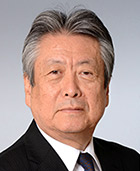
Happy New Year to all of you! Allow me to say a few words of greeting at the beginning of the new year.
Having been reappointed as Chairman of the Oto-Rhino-Laryngological Society of Japan at the general meeting and meeting of the board in May 2018, I have the pleasure of having been at the helm in both 2018 and 2019. We shall continue earnestly in our endeavors to contribute to the development of medicine and medical care in a wide range of fields related to otorhinolaryngology and head and neck surgery, provide high-quality medical care, promote basic and clinical research, partake actively in international exchange, and encourage studying and lifelong learning.
Last year, the society celebrated its 125th anniversary. In 1892, the society's first president, Eigoro Kanasugi, took up otology, rhinology and laryngology, all of which were separate branches of medicine in Europe at the time, and became the first person in the world to start teaching the three subjects together under a single stream, pioneering the discipline that we have now come to know as otorhinolaryngology. In the following year, he founded the Tokyo Otorhinolaryngology Society, which was the precursor to the Oto-Rhino-Laryngological Society of Japan, and also launched an academic journal that laid out the foundations of our society. Since then, the society has carved out a long and distinguished history, and today our ranks have swelled to include over 11,000 general members and 8,800 medical specialists, and we are affiliated with 16 other societies.
Both otorhinolaryngology and head and neck surgery are concerned with sensory organs and the musculoskeletal system; therefore, practitioners of this stream of medicine are responsible for handling a wide variety of diseases in many different areas encompassing many interdisciplinary skills. These specialists also treat patients of all ages, from infants to the elderly, both as physicians and surgeons. Since we deal with the senses of hearing, smell, taste and touch, it can also be said that we work with the crucial sensory organs responsible for the development of human society and the formation of culture. If these organs are impaired, aspects of daily life like communication (auditory sense, spoken language), eating, and swallowing can be affected, having a negative impact on a person's quality of life. Particularly in countries like Japan, which is facing an aging society and long life expectancy, deteriorated sensory functionalities, such as hearing loss in the elderly, problems with balance and swallowing, and an impaired sense of smell or taste, would greatly affect the quality of life, activities of daily living, cognitive function, and overall healthy life expectancy of the society as a whole.
We hold various conferences throughout the year, such as the AGM, and seminar sessions every May, and specialist courses in November. Our work is regularly published in our own journal and also in English language publications such as Auris Nasus Larynx. In addition to furthering academic research, we also strive hard to tackle social issues, such as community medicine, health in schools, welfare and medical services for infants and the elderly, and health insurance.
The society comprises 22 committees that work together closely in all our pursuits and contributions to society. In order to promote gender equality, we have also been proactive in appointing female doctors to positions on the committees, and at present, around 20% of the committee members are female.
Our branch of medicine is a highly specialized one, and since 1984, we have been running a specialist training program as part of our efforts to encourage lifelong learning. Through this program, we are dedicated to nurturing skilled physicians who can respond to needs in all clinical settings, so that they not only become knowledgeable, but also gather ample clinical experience and excel at diagnosis and physical/surgical treatment. In addition to this program, we started another specialist training program in 2017 that places even more emphasis on clinical achievements, to train qualified specialists at related institutions, including university hospitals.
I believe that one of the biggest responsibilities we have as a society is guaranteeing the quality of the medical care that we offer. In the past, we have responded with a system of certified consultants from related societies, such as hearing aid consultants, dizziness consultants, and deglutition consultants, but in the fields of otology and rhinology, we are considering implementing a new system overseen by a surgical supervisor.
We also established the Japanese Otorhinolaryngological Research Prize to promote the research of young doctors.
As we move toward our 150th anniversary, we shall continue in our aim to build a medical system that our patients can rely on, while contributing to, and increasing public awareness in, health preservation, medical care and welfare. We set these as our goals as we continue to strengthen our three central tenets of encouraging learning, nurturing highly qualified medical specialists, and providing dependable medical care.
In realizing the provision of high-quality, dependable medical care, it is particularly important for us to coordinate and cooperate in an interdisciplinary fashion with other medical departments. We will establish links with other medical departments and related occupations with a strong focus on patients, mutually boosting our presence, expertise, and combined strengths, so that we may continue to serve our patients in the most beneficial way as the world's leading department of otorhinolaryngology.
Hiroshi Moriyama, MD, PhD
Chairman, Board of Directors
The Oto-Rhino-Laryngological Society of Japan, Inc.
(January 16th, 2019)

